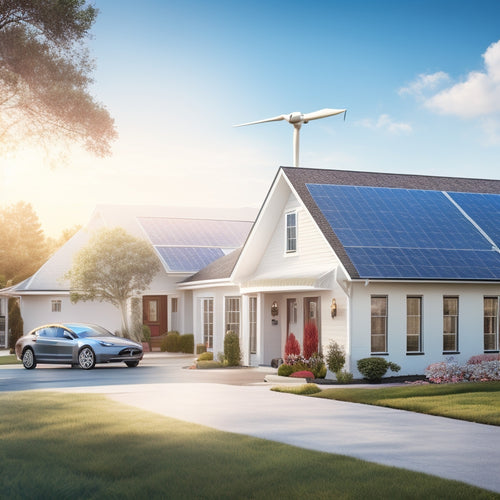
What to Consider When Calculating the Cost to Clean Solar Panels
Share
When calculating the cost to clean your solar panels, you'll need to evaluate several key factors. The size and complexity of your panels, including their design, tilt, and accessibility, will impact cleaning costs. The method and frequency of cleaning, including the type of cleaning agents used, will also affect maintenance expenses. Additionally, you'll need to account for environmental factors like sun exposure, dust, and debris, as well as equipment and labor costs, including local rates and certifications. By assessing these factors, you can create an accurate estimate and maximize your solar panel's performance. To get a clearer visualization of how these factors interact, evaluate the details.
Key Takeaways
- Assess panel size, complexity, and obstructions to determine cleaning efficiency and cost.
- Choose the right cleaning method and frequency based on environmental factors and panel type.
- Consider equipment type, labor rates, and certifications to calculate total cleaning costs.
- Factor in location-specific environmental factors, such as sun exposure, dust, and local regulations.
- Establish a maintenance schedule with measurable goals to optimize energy production and extend panel lifespan.
Panel Size and Complexity
As you evaluate the cost to clean solar panels, panel size and complexity emerge as critical factors. Larger panels require more time and resources to clean, increasing costs.
Additionally, complex panel designs with multiple layers or unique shapes can make cleaning more difficult, driving up expenses.
You'll also need to assess panel orientation, as tilted or angled panels may require specialized cleaning equipment or techniques, adding to the overall cost.
Installation type is another key evaluation, as rooftop installations may be more accessible and easier to clean than ground-mounted systems.
When evaluating panel complexity, you should assess the number of panels, their shape and size, and any obstructions that may hinder cleaning.
For example, panels with built-in inverters or other components may require more extensive cleaning procedures, increasing costs.
Cleaning Method and Frequency
The cleaning method and frequency you choose for your solar panels greatly impact the overall cost of maintenance.
You'll need to evaluate the type of cleaning agents used, as well as the frequency of cleaning to determine the most cost-effective approach. Manual cleaning methods, such as using a soft-bristled brush and mild soap, are often less expensive than automated systems that employ specialized cleaning agents.
However, automated systems may be more efficient and require less labor, potentially reducing overall costs.
The frequency of cleaning also plays a significant role in maintenance costs. Cleaning your solar panels too frequently can result in unnecessary water usage and increased labor costs.
On the other hand, infrequent cleaning can lead to reduced energy output and decreased panel efficiency.
You'll need to strike a balance between cleaning frequency and water usage to minimize costs while maintaining ideal panel performance.
Location and Environmental Factors
Your solar panel cleaning strategy must also account for location and environmental factors that impact maintenance costs. The amount of sun exposure your panels receive, for instance, can affect how often they need to be cleaned.
If your panels are installed in a region with high levels of dust, pollen, or other debris, you may need to clean them more frequently to maintain peak performance.
Local regulations can also influence your cleaning strategy. Some regions have specific guidelines or restrictions on water usage, which may impact your cleaning method.
Additionally, local environmental conditions such as proximity to coastal areas or industrial sites can increase the amount of dirt and grime on your panels, requiring more frequent cleaning.
When calculating the cost to clean your solar panels, consider the unique environmental factors at your location. Assess the amount of sun exposure, local regulations, and environmental conditions that may impact your cleaning schedule.
Equipment and Labor Costs
You'll need to factor in the costs of equipment and labor when calculating the total cost to clean your solar panels. The type of equipment you use will greatly impact your overall cost. For instance, using a water-fed pole system may be more cost-effective than a truck-mounted system. Additionally, the frequency and method of cleaning will influence your equipment costs.
| Equipment Type | Labor Rate (per hour) | Total Cost (per cleaning) |
|---|---|---|
| Water-fed pole system | $25 | $100 |
| Truck-mounted system | $50 | $250 |
| Robotic cleaning system | $75 | $375 |
| Manual cleaning tools | $15 | $60 |
| Specialized cleaning solutions | $30 | $120 |
Labor rates will also vary depending on the location, experience, and certifications of the cleaning personnel. It is crucial to research and compare labor rates in your area to get an accurate estimate. By considering these factors, you'll be able to calculate an all-encompassing cost to clean your solar panels.
Maintenance Schedule and Goals
Establishing a maintenance schedule and setting goals are critical steps in guaranteeing your solar panels are cleaned regularly and efficiently. By doing so, you'll reap various maintenance benefits, including optimized energy production, extended panel lifespan, and reduced repair costs.
When creating your schedule, consider factors like environmental conditions, panel tilt, and local regulations.
Determine the ideal cleaning intervals based on your location and panel type. For instance, panels in dusty or coastal areas may require more frequent cleaning, while those in cleaner environments can be cleaned less often.
Set specific, measurable goals for your maintenance program, such as achieving a certain level of energy output or reducing panel soiling rates. This will help you track progress and make adjustments as needed.
A well-planned maintenance schedule and clear goals will enable you to stay on top of cleaning tasks, guarantee your solar panels operate at peak performance, and maximize your return on investment.
Frequently Asked Questions
Can Solar Panels Be Cleaned With Soap and Water?
You can clean solar panels with soap and water, but you're better off using soap alternatives and specialized cleaning techniques to avoid damaging the panels' surface or leaving residue that reduces energy efficiency.
How Often Should I Inspect My Solar Panels for Damage?
Did you know 25% of solar panels are underperforming due to undetected damage? You should inspect your panels regularly, ideally every 3-6 months, looking for damage indicators like cracks, corrosion, or loose connections to guarantee peak energy harvesting.
Do Dirty Solar Panels Void the Warranty?
You should review your warranty conditions, as dirty solar panels might not necessarily void the warranty, but neglecting maintenance recommendations can lead to warranty disputes, so it's crucial to understand the fine print to guarantee your investment is protected.
Can I Clean Solar Panels During Peak Sun Hours?
You shouldn't clean solar panels during peak sun hours to avoid damaging them; instead, clean them during early morning or late afternoon when it's cooler, taking necessary safety precautions and using appropriate cleaning tools to guarantee a safe and effective job.
Are There Any Tax Incentives for Solar Panel Maintenance?
You're maneuvering a financial maze, but solar panel tax credits can be a guiding light, offering savings on maintenance costs; you'll find relief in the 26% federal tax credit, plus potential state and local incentives, illuminating your path to cost savings.
Conclusion
When calculating the cost to clean solar panels, you've considered the panel size and complexity, the cleaning method and frequency, location and environmental factors, equipment and labor costs, and maintenance schedule and goals. Now, you can weigh the importance of each factor, balance short-term expenses with long-term gains, and prioritize your cleaning strategy to maximize energy output and minimize costs. By doing so, you'll optimize your solar panel performance, extend its lifespan, and guarantee a strong return on investment.
Related Posts
-

Essential Accessories for Heavy Riders of E-Bikes
As a heavy rider of an e-bike, you need specialized gear that caters to your unique needs. Start with safety essentia...
-

Why Homeowners Are Embracing DIY Energy Independence
By taking control of your energy needs, you're breaking free from the uncertainty of utility bills and embracing a se...
-

5 Ways Bike Sharing Boosts Urban Sustainability
As you explore bike-sharing options, you'll discover five ways it boosts urban sustainability. By reducing congestion...


